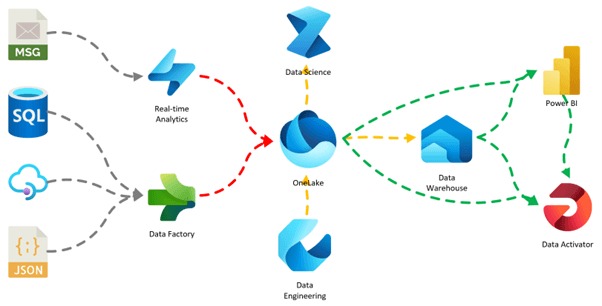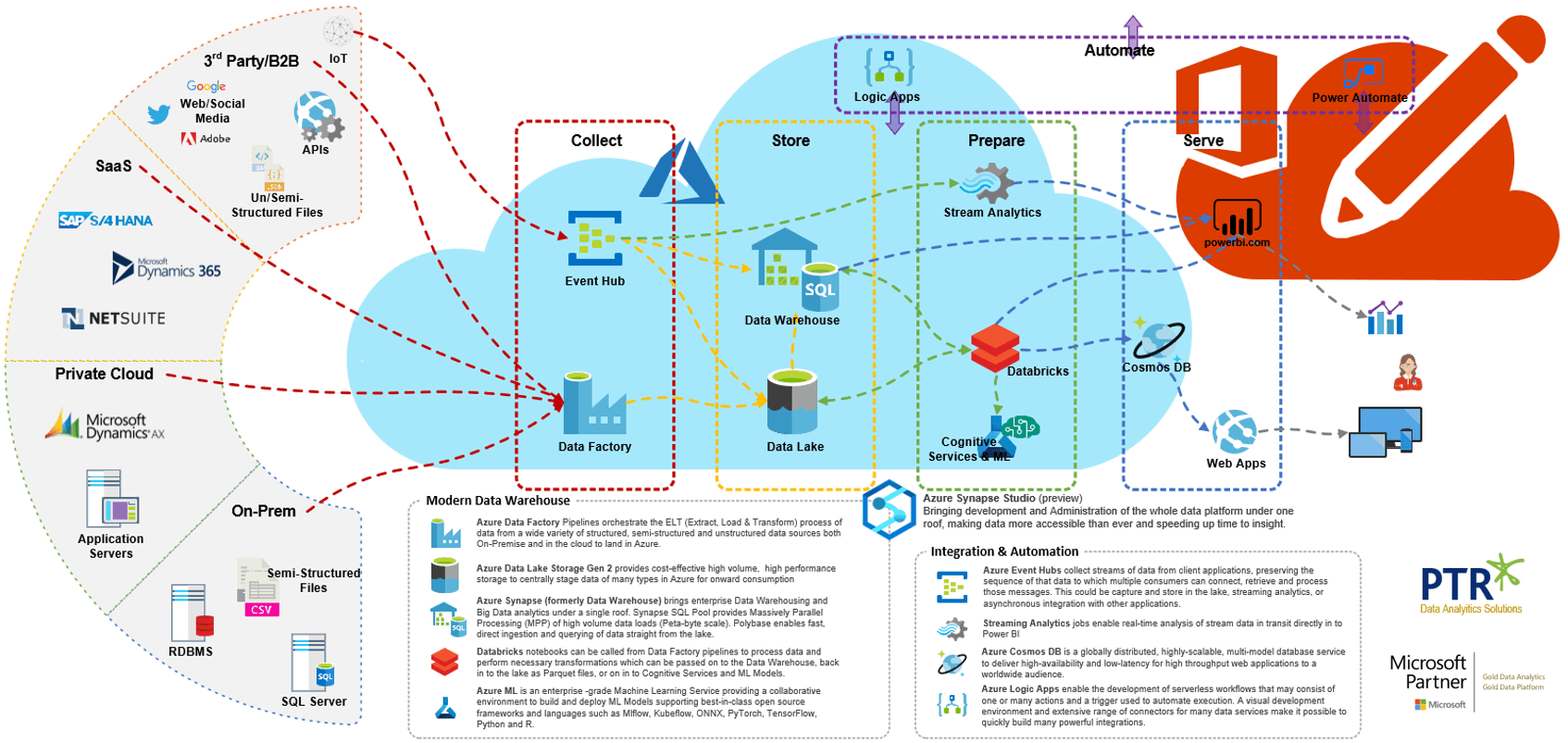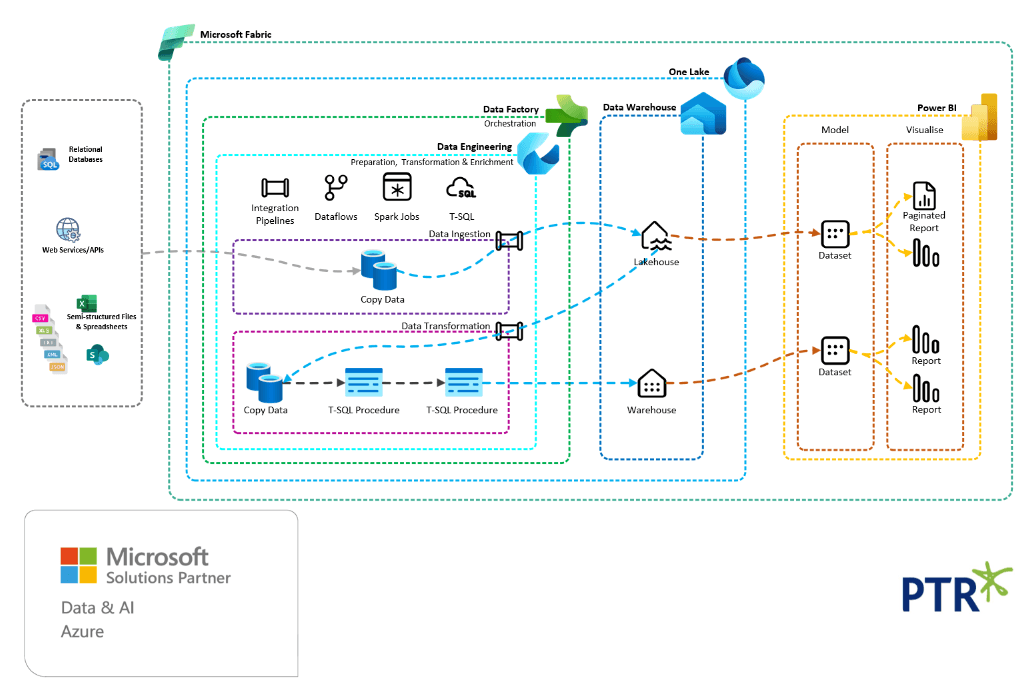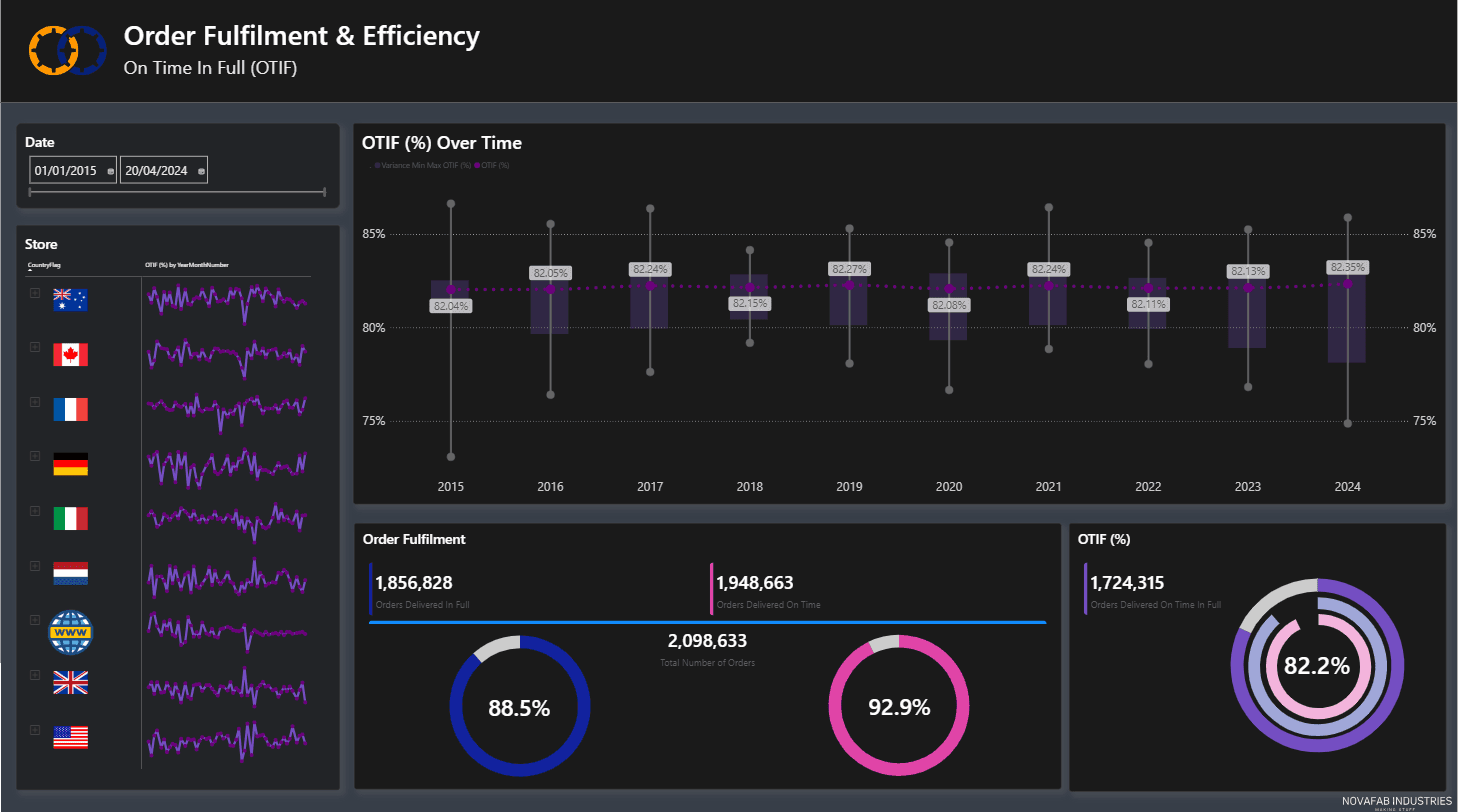Data Strategy Consultancy Services
Reliable Insight Depends on Reliable Data
For over 30 years, PTR has helped clients with data strategy and analytics, witnessing many changes along the way. What remains constant is the value of business data and the hidden insights it holds to drive informed decisions.


Our Data Strategy Consultancy Services to Deliver Your Data Analytics Solutions
PTR is a Microsoft Solutions Partner for AI & Azure Data offering a comprehensive data analytics consultancy and training service. We have been assisting clients with their data strategy solutions and data analytics solutions for over 30 years and we have certainly seen a few changes over that time! One thing that hasn't changed is the value of business data and the wealth of information hiding behind it that can offer valuable insight and drive business decisions.
With the sheer volume of data now collected and stored, and the distributed nature of application solutions, resulting in data located across on-premise, service and cloud-based repositories with varying data structure and architecture, the challenge of integrating all that data and delivering a single source of truth for data analytics is a huge challenge.
Add to the data source challenges the wide choice you are faced with for data and analytics platforms available to host and support your data analytics solutions and it can be a daunting world to launch into. Would you be better going with a Microsoft Azure solution or a Microsoft Fabric solution or a non Microsoft solution?
And what about Artificial Intelligence (AI)? Have you thought about how you might integrate AI into your data analytics solutions? Do you know how AI might be able to enhance your business activities? AI most definitely needs to be apart of your Data Strategy.
We are familiar with most of the challenges you have faced and will face at one time or another and we're well placed to use our wealth of experience to help you build your AI and Data Strategy and define a Data Analytics and Business Intelligence roadmap to reach your goal of a "One Truth" reliable, trustworthy 360-degree view of your business data.
To give you a taster of how a data analytics solution might look in the Microsoft world we have provided an Azure architecture diagram and a Microsoft Fabric architecture diagram.
The following diagram highlights the key layers of a Microsoft Azure based BI solution and gives inisight into the many considerations behind a BI Data Strategy.

A Microsoft Fabric solution might look like the following:

Data Strategy - Reliable Insight Depends on Reliable Data
Any Business Intelligence Solution starts with a strong Data Strategy.
A well-defined Data Strategy will help you identify the valuable asset of information that you have distributed around your organisation's numerous business applications and how you might use it to provide valuable insights not just into what has happened historically, but why it happened, and how you can use this new knowledge to minimise risk and exploit new opportunities that drive future business decisions.
What Is Data Strategy?
In summary there are four key areas to be addressed in your Data Strategy:
Data Governance
Data Management
Data Architecture
Business Intelligence
Artificial Intelligence
Developing a Data Strategy to drive a successful enterprise wide Business Intelligence solution requires a great deal of research, information gathering, forward thinking, stakeholder collaboration and analysis across your organisation to ensure that a future proof, fit for purpose, affordable, performant and stake holder engaging data analytics solution is achievable.
A successful Data Strategy requires the involvement of key business stake holders and data stewards who drive data governance and effectively "own" the data. It also requires the involvement of data strategy experts who have a wealth of experience in different types of data, different enterprise business applications, the challenges presented by big data, legacy, current and emerging technologies and architectures. It also requires the expertise of those who can understand the current and future data analytics requirements across the business.
If you are new to data strategy you may need a bit more of an explanation of what these five key areas refer to.
Data Governance
Data Governance is about the availability and use of your data, and about the integrity and security of your data. The management of these areas may be governed by a mix of internal and external policies and agreements. At all times you must ensure that your data is secure, consistent across the whole enterprise, reliable and trustworthy. Without data governance you run the risk of inconsistent and inaccurate reporting, which may lead to conflict and disagreement between different business functions, but also to poor business decisions driven by inaccurate information.
As organisations rely more and more on Data Analytics platforms to deliver insights and drive business decisions data governance becomes increasingly more important. Poor data governance can also lead to severe security breaches as data moves from one environment to another without ensuring consistent security and integrity rules are implemented across all platforms.
Data Management
Data Management is about integrating and storing data. Data is gathered from many enterprise systems and when integrated it will require cleansing, preparing, validating and ensuring data quality in readiness for data analytics.
Data Architecture
Data Architecture can fall into three categories:
Conceptual
Logical
Physical
In simple terms conceptual architecture is where we look at the overall picture at a high enterprise level identifying the key business elements and information assets and would involve the data owners across different sections of the business - those that responsible for the generation and use of the data.
The logical architecture is where we define the relationships between business entities. A logical architecture would be developed by solution architects and designers.
The physical architecture is the actual physical software implementation, the data platform. The physical data solution defining the underlying storage and service architecture such as cloud or on-premise data platforms, data lakes, data warehouses, business models.
Business Intelligence
Business Intelligence is where the magic of turning your datasets into insights takes place. Your data Strategy should define your current and future requirements in terms of key business drivers. The Business Intelligence aspect of your data strategy is where you can turn your wealth of data into a valuable business asset delivering data analytics solutions consisting of insightful and engaging dashboards and artificial intelligence driven analytics operations to improve business decision making and drive business processes.

Artificial Intelligence (AI)
AI is where we let computers take over or assist performing tasks previously only within the grasp of humans. AI can be used to scan documents and search for relevant content in text, pictures, audio, data and following a set of predefined rules and algorithms can analyse then results to look for patterns, trends and correlations across data sets to forecast outcomes or recommend actions. AI covers a broad range of capabilities from data analytics and data driven decision making through to robotics. You might find our blog on demystifying Artificial Intelligence (AI) of interest for a bit more of an insight to what AI is and can do for you.
Most organisations will likely encounter AI in the world of data analytics, using programming languages like Python to implement data science solutions with tools such as Fabric Notebooks, developing decision making algorithms and building machine learning models to enable AI systems to learn from historic and real time data and deliver fast insights from vast data sets very quickly.
Defining a Data Strategy - What have you got and where are you going?
Data Strategy is not a one type fits all and every organisation faces different sets of challenges which must be identified, considered and overcome. PTR specialise in offering independent, technology agnostic strategic advice and consultancy on the whole data platform, particularly with a view to supporting a successful Business Intelligence platform. Our Data Strategy consultancy services can help you towards a robust and future proof data strategy.
This may include for instance:
Audit and review of existing Data Estate
Assessing the suitability of a Data Warehouse and subsequent design and implementation
Requirements for separate enterprise grade modelling platform
Suitability of public cloud offerings
Challenging existing data collection procedures
Opportunities for further Data Consumers
Data Driven workflow and process automation
Requirements for Data Lake provision
Possibilities with regards Data Science and Machine Learning
Ensuring security, quality and reliability
Building a roadmap with realistic milestones
Through our Data Strategy Consultancy, and our expertise in Data Analytics and Business Intelligence, we can guide you through the process of developing your Data Strategy and integrating data from a wide variety of platforms, including importing, exporting, migrating, cleansing and de-duplicating, master data management, data quality. We can assist you with building a secure, reliable and trustworthy central "one truth" data model, and guide you through developing powerful, rich, engaging reports and dashboards that will visually tell the stories of your data.
After engaging in an initial assessment of your Data Strategy needs we will help you to build an effective Data Strategy. With you we will map out your data journey. We will start where you want to start and will work at a pace dictated by and appropriate for you. We will advise, guide and mentor your team to ensure that you get the best Business Intelligence solution in an affordable, appropriately paced, achievable and supportable manner.
A Data Strategy should drive a data analytics roadmap consisting of many milestones along the way, rather than attempting to deliver a single long term solution.
Share This Post
Frequently Asked Questions
Couldn’t find the answer you were looking for? Feel free to reach out to us! Our team of experts is here to help.
Contact Us